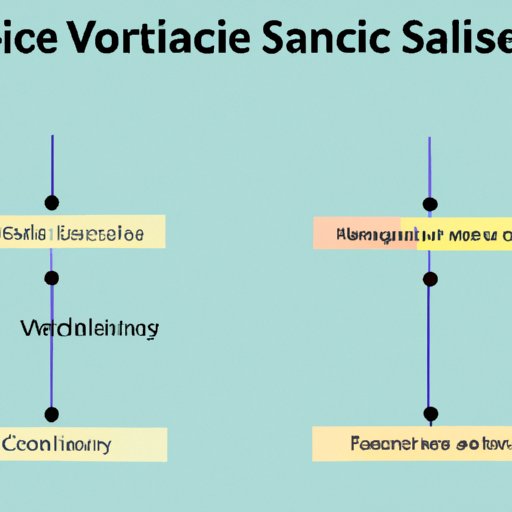Introduction
Science variables are an important part of any scientific experiment or research project. They are used to examine relationships between different elements, assess the impact of certain conditions, and analyze the results of experiments. In this article, we will explore what science variables are, the different types of variables, how to identify them, and their role in research.
Overview of Science Variables
To understand what science variables are, it is important to first define what a variable is. According to the Merriam-Webster dictionary, a variable is “a measurable factor that can vary in amount or character from one situation or subject to another”. This definition provides us with an understanding of what a science variable is: a factor that can be changed or measured in order to study its effects on other elements in an experiment.
In an experiment, variables are important because they allow scientists to observe how changes in one element can affect another. For example, if a scientist wants to study the effect of temperature on plant growth, they would need to measure and control the temperature while also measuring the growth of the plants. By doing so, they can observe the relationship between the two variables and determine how changes in temperature affect the growth of the plants.

Examining the Types of Science Variables
There are three main types of science variables: independent variables, dependent variables, and controlled variables. An independent variable is the factor that is being tested or manipulated in an experiment. This is the variable that the scientist has control over and can change in order to observe the effects. A dependent variable is the factor that is affected by the independent variable. This is the variable that the scientist will measure in order to observe the effects of the independent variable. A controlled variable is any factor that remains constant throughout the experiment. This variable is kept the same in order to ensure that it does not have any effect on the outcome of the experiment.
For example, in an experiment examining the effects of light intensity on plant growth, the independent variable would be the light intensity, the dependent variable would be the growth of the plants, and the controlled variable would be the type of soil used.
How to Identify Science Variables
Identifying science variables can be challenging, especially for students who are just beginning to learn about the concept. The first step in identifying science variables is to determine the type of variable. Is it an independent variable, a dependent variable, or a controlled variable? Once this has been established, the next step is to identify the relationship between the variables. How does one variable affect the other? Does increasing the independent variable increase the dependent variable, or vice versa?
For example, in an experiment examining the effects of temperature on plant growth, the independent variable would be the temperature, the dependent variable would be the growth of the plants, and the relationship between the two variables would be that increasing the temperature increases the growth of the plants.

Understanding the Impact of Science Variables
Variables play an important role in both experiments and data analysis. In experiments, variables are used to observe the effects of changing one factor on another. By controlling the independent variable and measuring the dependent variable, scientists can gain insight into the relationship between the two. In data analysis, variables are used to identify patterns and trends in data sets. By analyzing the data, scientists can gain insight into the underlying causes of the patterns and trends.
For example, a scientist studying the effects of air pollution on health may use data analysis to identify patterns and trends in air pollution levels and health outcomes. By analyzing the data, the scientist can gain insight into the relationship between air pollution and health and make informed decisions about how to reduce air pollution levels.

Exploring the Role of Science Variables in Research
When conducting research, it is important to understand the role of science variables. Defining and measuring variables is the first step in any research project. Scientists must identify the variables they want to study and then measure them in order to observe their effects. Once the variables have been defined and measured, the next step is to analyze the data from the experiments. By analyzing the data, scientists can gain insight into the relationship between the variables and make informed decisions about how to proceed with the research.
For example, a scientist studying the effects of temperature on plant growth may conduct an experiment in which they measure the temperature and the growth of the plants. Once the data has been collected, the scientist can analyze the data to identify any patterns or trends and make informed decisions about how to proceed with the research.
Analyzing the Effects of Science Variables on Results
It is important to understand the impact of science variables on the results of an experiment or data analysis. Variables can have both positive and negative effects on the outcomes of an experiment or data analysis. For example, in an experiment examining the effects of temperature on plant growth, increasing the temperature may increase the growth of the plants, but it may also damage the plants if the temperature gets too high. It is important to consider the potential effects of variables when designing experiments and analyzing data.
In addition, it is important to consider the potential of variables. Variables can have both direct and indirect effects on outcomes. For example, in the experiment examining the effects of temperature on plant growth, increasing the temperature may directly affect the growth of the plants, but it may also indirectly affect the growth of the plants by affecting the availability of nutrients in the soil. Understanding the potential of variables is key to designing effective experiments and interpreting data correctly.
Teaching Students About Science Variables
Teaching students about science variables can be challenging, especially for those who are new to the concept. One strategy for introducing students to the concept is to provide them with examples of relevant experiments. By providing students with real-world examples, they can gain a better understanding of how variables work and how they can be used to study relationships between different elements.
For example, teachers could introduce students to the experiment examining the effects of temperature on plant growth. By explaining the purpose of the experiment and the variables involved, students can gain a better understanding of how variables can be used to study relationships between different elements. Teachers can also provide students with additional experiments to further explore the concept of variables.
Conclusion
In conclusion, science variables are an important part of any scientific experiment or research project. They are used to examine relationships between different elements, assess the impact of certain conditions, and analyze the results of experiments. There are three main types of science variables: independent variables, dependent variables, and controlled variables. It is important to understand how to identify and analyze variables in order to design effective experiments and interpret data correctly. Finally, teaching students about science variables can be challenging, but providing them with relevant examples can help them gain a better understanding of the concept.
Overall, science variables are a crucial part of any scientific experiment or research project. Understanding their types, impact, and role in research allows scientists to design effective experiments and interpret data accurately. Teaching students about science variables is also important, as it helps them gain a better understanding of the concept and prepare them for future experiments and research projects.
(Note: Is this article not meeting your expectations? Do you have knowledge or insights to share? Unlock new opportunities and expand your reach by joining our authors team. Click Registration to join us and share your expertise with our readers.)
